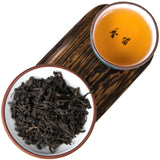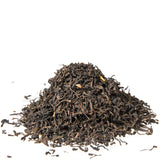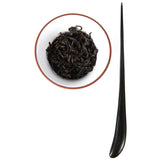– Sifu! I think a woman has secretly entered our temple! I just felt the smell of her perfume in the breeze!
– Settle down, young monk, for that is the aroma of my latest invention. I blended our tea leaves with jasmine petals to produce a tea that makes you forget the sorrows and worries of our mundane existence. Come, have a bowl with me.
The Ya'an Zang Cha Tibetan Jasmine Tea takes the best of both worlds, combining the sweet fruitiness of a classic Hei Cha with the enchanting aroma of jasmine petals. This fine tea continues an ancient tea-producing tradition in Sichuan, which some credit as being historically the first region to grow and consume tea.
This tea is known as “Tibetan Tea” because it was traditionally produced for the Tibetan people, whose daily life depended on it. The diet on the Tibetan Plateau is mostly meat and dairy, with very little access to fruits or vegetables. Fermented tea aids digestion, provides nutrients, and offers warmth in the cold mountain climate.
The Ya'an Zang Cha Tibetan Jasmine Tea uses a small-leafed variety that grows locally. The growing area lies within the 30th Northern latitude parallel - "the golden belt". That region is believed to be the source of the world's most premium tea. It has a perfect combination of microclimate, soil, and precipitation.
The tea bushes in Ya'an grow scattered at 800-1,200m above sea level. Farmers start to pick the tea in early spring. They then process the leaves to obtain the unfinished Maocha. The tea is then stored until several months later, when the jasmine flowers start to bloom. The yet unopened jasmine petals are stacked in a pile under controlled temperature. Once they begin to open, farmers layer them with the tea leaves. They repeat that step several times until the tea fully absorbs the jasmine aroma.

The picking standard for our Tibetan tea is a bud and two leaves. It balances a refined, delicate taste with a rich, mellow mouthfeel. The soup is bright red and clear - a result of deeper fermentation. Our Tibetan Jasmine Tea's taste is soft and oily, with a charming jasmine aroma. Its mellow character makes it the right choice for sensitive stomachs while gently assisting digestion. The heavily oxidized polyphenols make the taste sweet and the mouthfeel rounded. When brewing this Hei Cha, there is not a hint of bitterness or astringency, only a pronounced sweet aftertaste.
Mengding Mountain (蒙頂山) has a rich tea-producing history that goes back to the Tang dynasty period (618 - 906 A.D). Tibetan tea production in the region is as old as 1300 years, with Ya'An also being a major trading point on the Tea-Horse Road. In early 2008, the Chinese Ministry of Culture of the People's Republic recognized dark tea production skills, namely Ya'an Tibetan Tea (藏茶) production, as a national grade intangible cultural heritage.
• Place of Origin: Houyan Village, Yucheng District, Ya'an City, Sichuan Province
Jasmine: Qianwei, Sichuan Province
• Altitude: 800–1,200m
• Harvest Date: August 2021
• Picking Standard: a bud and two leaves
• Aroma: balanced jasmine aroma, licorice notes
• Taste: sweet, slightly earthy, with licorice and floral notes
• Cultivar: small-leaf variety (Xiao Ye Zhong)
![]() 212℉ / 100℃
212℉ / 100℃
 1g per 70-100ml
1g per 70-100ml ![]() 3-5min
3-5min
 1g per 20ml
1g per 20ml ![]() 10sec + 5sec for each subsequent infusion
10sec + 5sec for each subsequent infusion





